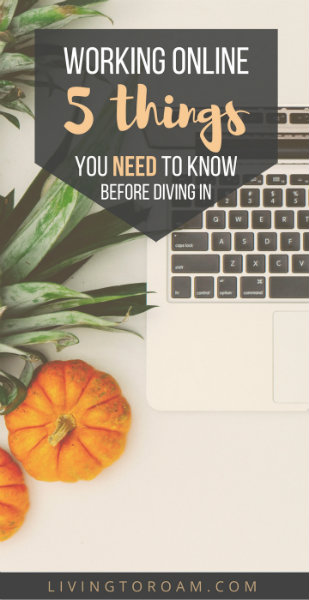First off, I’d like to start off by saying I’m not here to make assumptions about working online.
You may very well not be living a nomadic lifestyle, or working online… or ever aspire to do either one of these things. Perhaps you love the grey walls of your cubicle with that one suspicious stain that never seems to fade. Perhaps you thoroughly enjoy chatting with Barb at reception about the latest weather trends and hear about the vet being mean to her pet iguana. Barb seems like a great name for an office receptionist so let’s go with it.
Honestly, if that’s true then kudos. I’m not trying to trash what you’re doing.
Seriously, a cyber slow-clap to you my friend as my whole life would have been a lot easier if the office life didn’t make my throat close up with anxiety.
But I hope that if nothing else, my story and my list of things that I wish I knew about working online earlier will stick with you if you ever find yourself needing a bit of extra cash.
For the digital nomads or nomads-to-be out there really wanting to live on the road and make money from their laptop – I hope by the end of this post, you’ll see just how incredibly achievable it is if you’re willing to work for it.
So let’s get a bit of a background here shall we.
There’s no fancy Latin label for the condition I have that drove me to working online, but for our purpose today let’s just call it something of a cubiclophobia or a case of the ‘cubicle anxiety’ if you will.
Even though I just made that up about 5 seconds ago, I truly believe it’s a condition I may have had my whole adult life. It also explains why I consider myself to be a multipotentialite.
I’ve tried to get a ‘grown up job’ once or twice. The first of these was the dream of every broke ass 22-year-old like me in London at the time, a job in recruitment – as in, it allowed me to buy food and move out of the hostel I was living in.
Mind you, I’d just gotten injured in my previous job as a chef in France and was meant to be on bed rest, as I was on crutches sporting 11 gorgeous stitches in my calf.
So, of course my 2-week (doctor recommended) bed rest, turned into crutching and backpacking around the Greek islands and interviewing for jobs in England.

I somehow lied my way into this high-paying recruitment gig, mainly by making hilarious Star Wars references and using ‘finger guns’ a lot. I saw the finger guns thing in a movie about stock investing once, after my brief success with it, I’d say about 60% of the time, it works every time.
The fact that I got the job was a complete miracle. At the time, I was high on painkillers, left my crutches in an alley behind the office and duct taped my bandages so the cut on my leg wouldn’t bleed through my pants during the interview. This was commitment, with just a dash of insanity.
It took only a month of being in ‘regular person clothes’ until I started exhibiting symptoms of cubiclophobia.
Aside from excessive restless leg tapping at work, my symptoms presented themselves in the form of a newfound addiction to extreme out-of-work activities to make my work life appear less boring.
I skateboarded to and from work, I went paintballing, and I went on far too many Tinder dates (pre-Nick of course). If you don’t think Tinder dating is an extreme activity then you’ve never been on a Tinder date.
Anyways, if you’ve ever tried to bike, let alone skateboard in London traffic, you could probably guess that my extreme adventures were short-lived.
My nomadic life on the road began calling to me as soon as my leg healed. I handed in a Cyndi Lauper-inspired resignation letter, explaining that girls… really… do just wanna have fun – and I was off yet again!
The office life was never one for me, and working online has allowed me to live and travel outside of the 9-5 office hours and annual leave allowance.
When I first started freelancing, there were a few things that were quite unexpected that I wish someone could have warned me about.
So here they are, the 5 things I wish I knew before I started working online:
Surprising thing about working online #1
How your offline social life may be affected.
One thing you need to know about me is that I don’t have the ability to sugarcoat anything. It’s a skill that I’ve been trying to work on over the years.
I think I’ve mastered it around small children, but with adults I often opt for brutal honesty. So in the case of your potential freelancing future – let me be very honest in saying that your life will definitely change. Some of these changes will be positive and some will be challenging to accept.
If you’re already travelling and you tell your backpacking buddies that you will now be making serious $$ by logging into a client’s Facebook account once a week they’ll probably be stoked for you and want to know more. Travellers are ALWAYS looking for ways to make money while travelling, as well as sharing money-saving tips and tricks.

But if you’re starting the way we did – from home, surrounded by your family and friends who are working in their 9-5s and perhaps not understanding your unusual decision – chances are, you will encounter some resistance.
And when you do you’ll have a few choices:
1) Tell them to suck it, pack a backpack, accept your fate of never appearing in your family’s Christmas cards again and decide your love of freedom is worth you never getting to taste your grandma’s lasagna again. (Not the recommended choice)
2) Wait until you have a few clients and a bit of income from your freelancing career to prevent a great deal of resistance from your family who might actually just be worried about your financial security fearing that the Internet is just a place of pyramid schemes and online cults.
3) Tell them what you’re doing early on but try and understand their point of view and use any doubt they may have as a powerful motivational tool to get you even more excited to make it as a freelancer!
Point is, everyone has completely different reactions to change.
The main thing I learned from ‘coming out’ as a freelancer to my friends and family is that often, people just fear what they can’t understand. They may just need a bit of guidance in relating to it in terms that make sense to them.

Some people will relate more to the concept of more freedom; some will be all about the finances. It doesn’t matter if their priorities match yours, but if you can anticipate their objections you’ll be able to better prepare yourself.
At the end of the day, if a lot of your mates are stuck in jobs they hate but don’t really want advice on how to change their situation; you might just have to prepare for the possibility that they won’t ever want to hear about it.
I lost touch with a lot of people because they were content in their own misery and claimed that my ‘freedom lifestyle’ was just a phase like when I dyed my hair half pink half blue. And just like my outrageous hairstyle, I still stand by the choice to pursue working online as a serious career.
Surprising thing about working online #2
How long it will (realistically) take you from the moment you start learning the skills you need to freelance to receiving your first paycheck.
I cannot stress this enough: this part is completely up to you.
To put it into perspective, between me finishing my online course to actually having my money from my first freelance client in my Australian bank account was about two to three weeks. That paycheck was a whopping $60. But it was for only three hours worth of work. Three hours I spent just hanging out on my client’s Facebook page and Instagram, interacting with her audience and occasionally posting an article. This is, of course, the more simplified version of what I did but needless to say I was pretty chuffed with myself.
Don’t get me wrong, there were a lot… and I do mean a lot of people who took the exact same course and months went by without them getting any paid work at all.
The difference was, I didn’t actually give myself the option to fail. Those who did were people still working their regular 9-5 jobs and expected freelancing to replace their full time income in a matter of weeks.
I had friends and family calling me a quitter and an Australian visa that didn’t even allow me to work as a burger flipper with the 14-year-olds at McDonalds.

This lack of choice, my debt from having a serious travel addiction, and again, using that doubt as motivation was the entire difference between success and failure.
Myself and those other potential freelancers had the same skills because we took the same course. In fact, a few of them were much more qualified to do the work. But they messed up by having unrealistic expectations and no major push to succeed.
So, you need to know that it’s very realistic to get started and start earning money very quickly by working online. It was only about two months after that first $60 paycheck, until I was earning about $500/week working only two to three full days per week.
But it’s up to you to put in the hard work… and not give yourself the option to fail.
Surprising thing about working online #3
The difference between the online interview process and the typical, offline interview process.
This is probably one of the biggest differences I experienced when I started working online.
It’s insane how quickly things move in the freelancing world. After setting up a profile on Upwork.com (the freelance platform I work through) I got approved the next day, and applied for my first job. I then had an interview for that job the next morning, got the offer sent through twenty minutes later and began earning money from that job that afternoon.
When you go onto Upwork.com a statistic pops up saying it takes people an average of 3 days to hire someone for a job on there. I’ve actually submitted a proposal for a job that had just been posted, got a straight offer without an interview and had completed the job by that afternoon. I’ve only ever been interviewed via Skype for jobs that were a long-term commitment of three months or more with the client. Every other job I was hired for after only a few instant messages. It’s insane how fast the online world moves.

Compare that to the multi-stage, drawn-out interview process you get put through for even the most mediocre jobs in the offline world.
The reason for this is simple – as easy as it is for someone to hire you online, it’s just as easy for them to fire you if you’re crap. Sorry, but it’s true.
Whereas in the offline world you’d get HR involved if someone fired you from a job without a specific reason to do so. Hello, unfair dismissal case.
The downside of this is that (at least at the beginning) you have to be quicker than your competition to get the best jobs. And remember that when people pay you – they’re paying for their time not yours.
Because of this – any indication that you will be someone who asks a lot of questions or isn’t prepared to do the job with minimal direction can often result in someone else getting the gig.
Surprising thing about working online #4
The good and bad of quitting when working online.
If you’re working online through a freelancing platform (like Upwork.com) ending a contract has a few good and bad points you should be aware of.
Every time you end a job, whether it’s because it has been completed to the client’s satisfaction or because you just want out – both the client and yourself will be asked to review your working relationship.
You will both then have each other’s scores and any comments publicly displayed on your profile.
This, in turn, can be really great for applying for future jobs, or it can be really terrible.

Pros of quitting working online:
So you hated the job, the client didn’t turn out to be like you thought or you just don’t have the time to do it? Just click “end contract” you can always find more work! The quick turnaround can definitely be used to your advantage.
There’s no awkward two-week notice period where you have to avoid eye contact with everyone in the office either. (Though it’s definitely good practice to give notice when leaving a client.)
Another thing I really love about Upwork.com is that if you do a great job, you can give yourself a promotion and increase your hourly rate. You are also more likely to get higher-paid jobs and higher-standard clients in the future because of your positive rating from past jobs, love this!
It’s kind of like having testimonials from your clients on your own site, except on Upwork.com it’s incredibly transparent so your future clients will not only see the good but also the bad.
Cons of quitting working online:
As good as the public feedback system can be, it can also backfire on you as well. You might have done a stellar job to the best of your ability but for some reason the client just wasn’t as impressed as you’d hope. Maybe the project wasn’t communicated effectively and they didn’t give you the option to make any changes before leaving you some poor and perhaps unwarranted feedback.
Alternatively, if you really didn’t do a decent job and you’ve had an off day (we’ve all been there, don’t worry) then it will likely be put out there for the world to see. This sounds intense, but really all it does is make the good ratings seem that much better.
Lastly, this system prevents the online version of a dramatic ‘mic drop’ moment calling your boss an asshole and telling the entire office you hate them and that you’ve been the one stealing all the sandwiches from the fridge. Because if you do this on Upwork.com – your future clients will see it.

That This is because any future clients will be looking at your profile knowing that those ratings are a true reflection of your work. They know this because if you had done a bad job, your client most certainly would have rated you accordingly.
Surprising thing about working online #5
How different it is having an online boss from having an offline or ‘real-life’ boss.
Remember the adorable concept of getting paid to train for a job? It doesn’t really exist online. Not for contract work anyways, maybe if you’re working for someone remotely, but for full-time freelancers they might put in the effort and cash to train you (if you’re lucky). However, from my experience, most clients will normally pay you for about an hour or two to spend looking through anything they want you to manage. This could include their website or social media accounts, then they’ll give you 20 minutes of their time to ask any and all questions you have. And then never, ever ask them again.

Again – they’re paying you for their own time, not yours. This is key to remember.
This was actually a surprisingly difficult adjustment. I had one client I worked with for five months and never even heard their voice or saw what they looked like aside from their email profile photo.
It made me feel like I was one of Charlie’s Angels.
It’s important to not take this personally. Some clients will be amazing at rewarding you for your efforts and recognising the hard work you do. Some will be a bit shit at it and unfortunately there’s nothing you can do about that.
What about all that hard work you’ve been doing all day, how could they not be impressed? Remember that your client is not physically there to see you slaving away at your desk (or by the pool) so if the results don’t add up, it can be a little disheartening to receive a total lack of appreciation.
This sort of detachment also means that you’re a bit disposable if you screw up. It’s hard to get used to the fact that another eager freelancer can replace you within the hour.
In saying that, of course your clients don’t ever want to replace you and if you possess a serious care factor for the work they assign you then they won’t have a reason to look elsewhere. But it is definitely an adjustment.
The key is not to ever get too cocky or too comfortable because that’s when things can start to go wrong. If you ever feel yourself going in that direction remember to sing the following lyrics in Beyoncé’s voice in your head “I can have another you by tomorrow – Don’t you ever for a second get to thinking you’re irreplaceable”.
Nah, just kidding it’s not quite that dramatic!
There are definitely a lot more differences between working online and the traditional ‘offline’ jobs that you’re probably more familiar with, but hopefully these five will help you prepare a bit for the changes you may experience when beginning your freelancing journey.


0 Comments